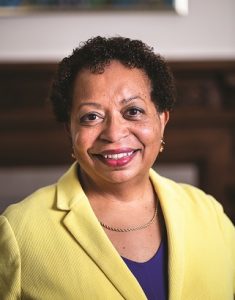Bantam Connections
Trinity College President Joanne Berger-Sweeney

As a neuroscientist, I know something about the importance of connections. In the brain, one neuron can have 10,000-plus synaptic connections with other cells; these cells form networks that serve diverse functions such as walking, seeing, and learning. Neuroscience research shows that social connections are important, too; as humans, we want to connect with others, to belong to groups and form relationships.
Those in the Trinity community have a strong desire to connect; one story that I heard when I was interviewing with the college is that when a Trinity alum is driving and sees another car with a Trinity sticker, that alum wants to speed up to see who’s in the car. I loved that story, and in my four years as president, I have found that it resonates in my interactions with Trinity alums. The passionate engagement of our community members is one of our greatest and most distinguishing assets. Our new mission statement—Engage. Connect. Transform.—underscores this Trinity characteristic. We’re all about making connections—with each other, with Hartford, and with the wider world—to help fellow Bantams become successful, engaged global citizens and to move forward our beloved Trinity.
The alumni survey we conducted earlier this year [please see page 36] was loud and clear on these points. The volume and quality of responses that we received far surpassed the survey firm’s expectations, but we knew you’d have a lot to say. And, on the issue of connecting, you were loud and clear about a desire to be more deeply engaged, both with the college and with one another. We heard you!
We know from the survey and ongoing conversations with the National Alumni Association (NAA) that Trinity alumni are eager to connect with each other to give and receive career advice and support, as well as to help current students explore career interests and find success after graduation.
Helping fellow Bantams succeed has long been a Trinity tradition. Lou Shipley ’85, who has just joined our Board of Trustees, is one excellent example of this. Lou has hired 10 Trinity grads during his tenure as president and CEO of Black Duck Software and hired several others at his previous company. Not only does he come to Trinity every February to participate in a program on careers in technology (and recruit!), but he also has built at Black Duck a rotational development program with liberal arts grads in mind, training them on all aspects of the company. With their liberal arts training, Lou tells me, “Trinity students have everything employers want.”
To build on this tradition, the college will soon launch a new career-networking platform. Called PeopleGrove, the platform will allow alumni to raise their hands to offer perspective, advice, and mentorship to fellow alumni and to today’s students. We’re excited by the possibilities this new platform will afford us to connect more effectively on careers, including the ability to create affinity groups by career field, geographic region, or a particular Trinity affiliation (women’s basketball alumnae, or engineering majors, for instance).
Thank you to the NAA for its partnership with Career Development and Alumni Relations in evaluating PeopleGrove. We anticipate rolling this platform out to alumni this fall and introducing it to students later in the academic year. Please consider signing up.
This work is a key component of Summit, our strategic plan, particularly in ensuring that students can take full advantage of the unique opportunities Trinity provides to help them succeed in the classroom and in the wider world. Also, Career Development recently launched a new job-finding platform for students called Handshake, which allows them to connect directly with employers around the globe who are looking for students who possess the traits and skills that Bantams have in abundance.
Those traits—passion and a collaborative spirit among them—were at the heart of the creation of the Bantam Network. Designed by students, for students, it launched on campus in 2015 to help foster connections—connections among students and connections to the resources on campus. Though it started and has found tremendous success as a first-year mentoring program, we always imagined that this mentoring network would extend beyond the first year and engage the entire Trinity community, including alumni.
It’s gratifying to see the strengthening of the Trinity network—this is truly a Trinity-wide effort. And it’s inspiring to know how deeply you all care about Trinity and want to help the college and our wonderful Bantam family. Remember to speed up just a little bit the next time that you see a Trinity sticker in someone’s car window.
